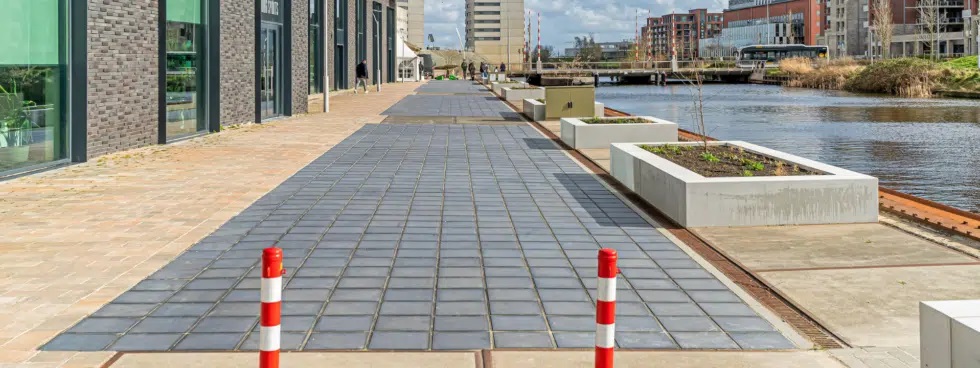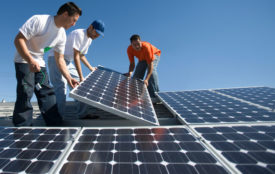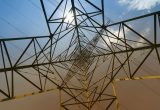Europe’s new solar footpath from recycled plastic waste that generates electricity
On Friday, March 24, 2023, Philip Broeksma, Councilor of Energy opened the EU’s new solar footpath in the city of Groningen, in the North of the Netherlands. The 400m2 solar pavement path is a sustainable walkway created using 2544 PLATIO solar pavers (an innovative energy-generating paver) that produces approximately 53,000 kWh of electricity per year.
The green energy produced by PLATIO powers the municipality’s city hall, making the building more sustainable. This experiment is part of the European Union’s Making City project. It aims to develop Positive Energy Districts (PED), demonstrating the potential of innovative solutions to tackle climate-neutral goals. Now Kolenkade, the street where previously coal used to be brought for energy, has become an energy-generating street.
Double-sustainable and double use
‘This innovative solar footpath contributes to the city’s ambition of becoming CO2 neutral by 2035. PLATIO solar pavers are doubly sustainable because they not only provide green energy but are made of recycled plastic. It makes double use of space: the solar footpath generates electricity, while people can simply and safely walk on it. It is an example of how to use space in the city in a smart and sustainable way’ – explained Philip Broeksma, Council of Energy from the Municipality of Groningen.
András Sebők, the CEO of PLATIO Solar helped us better understand the significance of the PLATIO solar footpath: ‘Their solar pavers are an environmentally friendly alternative to traditional pavings, as they are a source of renewable energy and do not emit greenhouse gases. This 400m2 solar pavement installation has a projected yearly production volume of 53 000 KW and offsets approximately 18 tons of CO2.
Theo Hoek from Bengsolar, installer of solar pavement as the Dutch reseller of PLATIO, explained more about the performance: ‘This energy production equals 18 average Dutch households’ yearly energy needs. We are monitoring the system and its performance on an application. Let’s see how PLATIO performed today– showed the application on his phone – today’s production can power 47 houses’ for 1 day.’
András Sebők closed this speech by giving some insights about how the company’s solar paver fits into this project: “PLATIO pavers can be the cornerstone of a carbon-neutral future, as a green building material that contributes to reducing carbon emissions in buildings. The product itself is a net-zero building material. Now, this solar path powers a public building, but communities can use this technology for other uses as well, as it can power buildings and any outdoor utensils as well. We appreciate the opportunity to be integrated into the Making City project, we do hope this installation will fulfill and tackle the climate-neutral goals of Groningen.”







